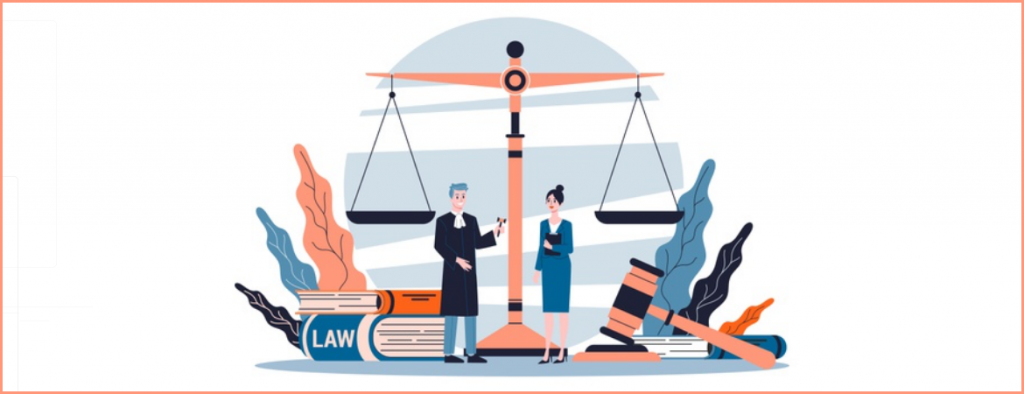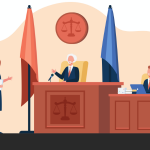The Supreme Court of India.
The Apex Body.
The be-all and end-all for many lawyers…
Irrespective of the area of law you practice in, one thing I can most certainly assure is that the moment you enter the premises of the Supreme Court of India, the aura of being there hits you hard. There is a rush of emotions- excitement, intimidation, nervousness, hope, and above all, a sense of responsibility.
You are amongst some of the strongest and brightest minds of the country and there is an immense responsibility to ensure that you make your visit worth it.
However, it so happens that quite often you end up feeling like an outsider while you are walking in those corridors. The following could be the reasons:
Different requirements related to dress, entry etc.
Getting an entry to the Supreme Court is quite different from that of other courts. There is a certain type of dress code you need to follow. Wearing a lawyer’s gown is a prerequisite and all lawyers are expected to enter the premises wearing the same. There is a special restriction for student interns who are not provided entry on the miscellaneous days of Mondays and Fridays. Please remember, this rule is also applicable to those who do not have sanad (enrolment with the BCI). Those who are unaware of these rules may find themselves in a difficult position with their seniors. Moreover, there is also a whole different process to get an entry into the premises by issuing a pass. It is extremely important that you take the help of your office clerk who is a regular visitor to the Supreme Court to apprise yourself of the documents that you need to carry and the process that needs to be followed.
Lawyers practising in the Supreme Court are different from those practising in the High Court
You will realize that there are some lawyers who exclusively practice in the Supreme Court. They may have a practice in other courts as well, but the majority of their matters are before the Supreme Court. There is a concept of “Advocate on Record” (AoR) as regards practising before the Supreme Court. Only an AoR is permitted to file a case before the Supreme Court. This is different in other courts, where no examination or specific enrollment is required to argue, other than limitations imposed to lawyers registered outside a state bar’s jurisdiction.
However, if you intend on filing a case before the Supreme Court, you are required to either be an AoR or have to get it filed through one. Being an AoR is actually quite prestigious and lucrative and we will cover more details about the same in another article. For this, you need to pass the AoR exam and have a litigation practice of over 4-5 years which should involve one year of practice with an existing AoR. Currently, there are 2000+ Advocates on Record.
Jurisdiction over special matters
The Supreme Court also has exclusive jurisdiction over certain matters like constitutional matters, contempt, special leave, and entertaining transfer petitions. Lawyers wanting to practice in the Supreme Court should not only be well versed with these matters but should also know how this jurisdiction differs from those in other courts.
Practice and procedure are different
Every High Court has its own set of rules. Similarly, the Supreme Court of India also has its own set of rules. The registry is extremely particular about the same. As mentioned before, only an AoR can file a case before the Supreme Court.
Moreover, if you have less than one year of experience after enrolment, you are technically not allowed to argue before the judges of the Supreme Court. You are only permitted to mention the matters or seek an adjournment or a pass-over.
However, in reality, it may so happen that while you have gone to the Supreme Court to merely mention a matter or seek an adjournment, the judges would ask you to argue the matter instead- even if you are lacking the technical requirement of one year of working experience. At that point in time, your client’s and senior’s interest is at stake so you ought to be completely prepared with the matter as if you were to argue it and should be ready to give a short and brief submission if need be. This is what is called court craft and people learn it the hard way through experience. But the smart thing would be to be aware of these small yet significant aspects and be prepared for the same.
If you are serious about litigation, then trust me, the Supreme Court like I said is the be-all and end-all of everything.
Once you have handled a matter before the Supreme Court, you are no longer the same lawyer – even if you have had a minuscule contribution to the entire matter. You cannot beat the feeling you get when you see your name on the appearances list in the order sheet. The feeling gets compounded when you actually get the opportunity to argue before some of the brightest minds in the country.
It takes courage, yes, but more than that it takes strategy, intense preparation, and court craft. Earlier, people used to prefer practicing for years before lower courts and High Courts, before advancing to the Apex Body. But that’s not the case anymore; any lawyer with some special training can take up and handle matters. And guess what, you need not be an AoR for the same. Yes, you still need to be an AoR to file a matter before the Supreme Court but there are a lot of other ways how you can get access to the work that happens before it and to actually get involved.
If you want to learn more about the same, take a look at our recently curated Certificate Course in Advanced Supreme Court Practice: drafting, procedure, and strategy.
In this course we will hone your research, drafting, and arguing skills specifically for Supreme Court practice. Besides that, we will also guide you on how to deal with day-to-day practical challenges you will face, and how to grow your practice and profile. We will impart holistic training so that you feel at ease while walking down the corridors of the Supreme Court. Moreover, those wishing to prepare for the AoR exam will also find a structural and exhaustive preparation material with respect to the same.
What are you waiting for? We can only get your foot in the door; you are the one who needs to get in.
If you want to be notified about other workshops and webinars conducted by LawSikho on Supreme Court Practice, please join the Telegram or WhatsApp group below:
Telegram Group: https://t.me/joinchat/VlcPkD6lTNt7G8iK
WhatsApp Group: https://chat.whatsapp.com/Iy1xm7AdQBL0juq24Pn1vO
Students of Lawsikho courses regularly produce writing assignments and work on practical exercises as a part of their coursework and develop themselves in real-life practical skills.
LawSikho has created a telegram group for exchanging legal knowledge, referrals, and various opportunities. You can click on this link and join:
https://t.me/lawyerscommunity2
Follow us on Instagram and subscribe to our YouTube channel for more amazing legal content.





 Allow notifications
Allow notifications
